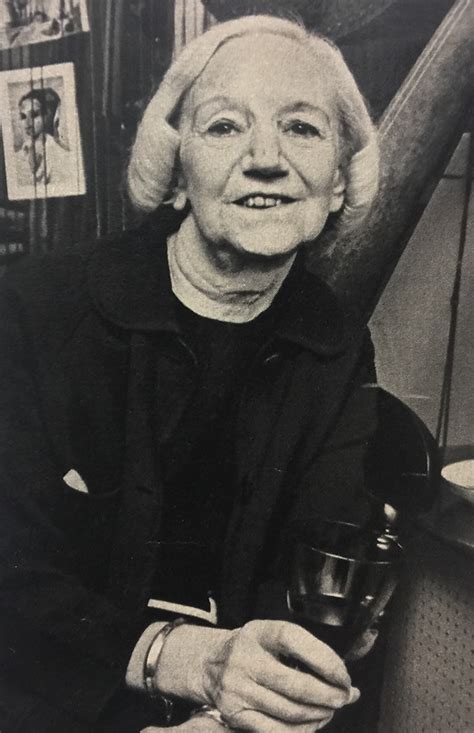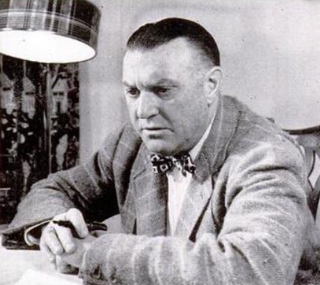A Quote by Marie Lu
Day, the champion of the people, the one who can't bear to see those around him suffer on his behalf, who would gladly give his life for those he loves.
Related Quotes
The man has a curious inborn conviction of his own superiority which is quite unshakeable. All his life he has bullied and browbeaten those around him by his high-and-mightiness and his atrocious temper. As a boy he terrorized his entire family by his tantrums, when, if thwarted, he would throw himself on the floor and yell till he went blue in the face. It has been much the same ever since. Everyone's terrified of his rages. He has only to start grinding his teeth, and people fall flat before him.
Misery, in cold truth, is a weight less upon those who undergo it than upon the minds of those who see it; for he who is cold and starving is so busy in his efforts to obtain warmth and food that he has little time for self-pity, and endures his unhappy condition better than those who take it upon themselves to suffer for him.
Had He not emerged from the tomb all our hopes, all our salvation would be lying dead with Him unto this day. But as we see Him issue from the grave we see ourselves issue with Him in newness of life. Now we know that His shoulders were strong enough to bear the burden that was laid upon them, and that He is able to save to the uttermost all that come unto God through Him. The resurrection of Christ is thus the indispensable evidence of His completed work, His accomplished redemption.
A certain monk told me that when he was very sick, his mother said to his father, "How our little boy is suffering. I would gladly give myself to be cut up into pieces if that would ease his suffering." Such is the love of God for people. He pitied people so much that he wanted to suffer for them, like their own mother, and even more. But no one can understand this great love without the grace of the Holy Spirit.
If he looked into her face, he would see those haunted, loving eyes. The hauntedness would irritate him - the love would move him to fury. How dare she love him? Hadn't she any sense at all? What was he supposed to do about that? Return it? How? What could his calloused hands produce to make her smile? What of his knowledge of the world and of life could be useful to her? What could his heavy arms and befuddled brain accomplish that would earn him his own respect, that would in turn allow him to accept her love?
The intelligent and good man holds in his affections the good and true of every land -- the boundaries of countries are not the limitations of his sympathies. Caring nothing for race, or color, he loves those who speak other languages and worship other gods. Between him and those who suffer, there is no impassable gulf. He salutes the world, and extends the hand of friendship to the human race. He does not bow before a provincial and patriotic god -- one who protects his tribe or nation, and abhors the rest of mankind.
Therefore if mine enemy hunger, let me feed him; if he thirst, let me give him drink. Now in order to do this, (1) We must see good in that, in which other men can see none. (2) We must pass by those injuries that other men would revenge. (3) We must show we have grace, and that we are made to bear what other men are not acquainted with. (4) Many of our graces are kept alive, by those very things that are the death of other men's souls.... The devil, (they say) is good when he is pleased; but Christ and His saints, when displeased.
There is an earthly sun, which is the cause of all heat, and all who are able to see may see the sun; and those who are blind and cannot see him may feel his heat. There is an Eternal Sun, which is the source of all wisdom, and those whose spiritual senses have awakened to life will see that sun and be conscious of His existence; but those who have not attained spiritual consciousness may yet feel His power by an inner faculty which is called Intuition.
Jesus said several times, “Come, follow me.” His was a program of “do what I do,” rather than “do what I say.” His innate brilliance would have permitted him to put on a dazzling display, but that would have left his followers far behind. He walked and worked with those he was to serve. His was not a long-distance leadership. He was not afraid of close friendships; he was not afraid that proximity to him would disappoint his followers. The leaven of true leadership cannot lift others unless we are with and serve those to be led.
That his prayer was nothing else but a sense of the presence of GOD, his soul being at that time insensible to everything but Divine love: and that when the appointed times of prayer were past, he found no difference, because he still continued with GOD, praising and blessing Him with all his might, so that he passed his life in continual joy; yet hoped that GOD would give him somewhat to suffer, when he should grow stronger.


































